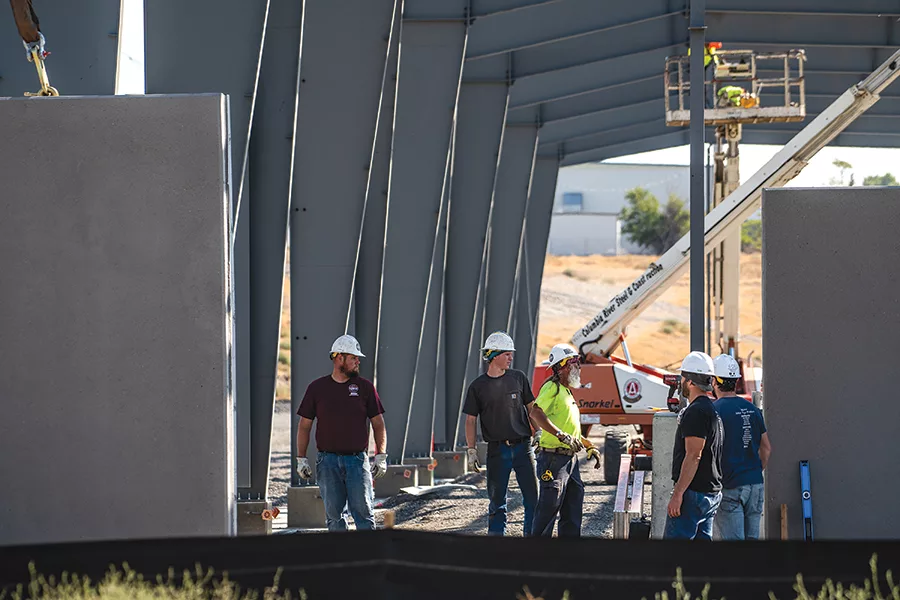
Home » Commercial Real Estate: Private investment dominates commercial picture, for now
Commercial Real Estate: Private investment dominates commercial picture, for now

October 15, 2021
Private investors are pouring hundreds of millions of dollars into Tri-City commercial construction in a shift from recent years, when school construction and public projects, such as Richland’s Duportail Street bridge and fire stations, dominated the sector.
Fueled by low interest rates and a backlog of projects booked in the busy pre-pandemic days, privately funded development is overtaking those sponsored by government entities.
The major private projects dotting the Mid-Columbia include industrial, neighborhood and retail centers. Pasco is a regional hub of activity, but Kennewick, Richland and West Richland have their share too.
“Residential can’t keep up. Commercial is looking at growth areas for future expansion,” said Joel Bouchey, regional director and public policy coordinator for Inland Northwest, the Kennewick-based chapter of Associated General Contractors of America.
Construction cycles
Construction tends to occur in cycles, with public sector work such as schools, roads, water plants and fire stations filling the order books and then giving way to private. With Congress weighing a $1 trillion – or possibly more – infrastructure package, public sector work will return with a vengeance.
The cycle is not as pronounced in the Tri-Cities, where construction – and demolition – at the Hanford nuclear site dampens the impact. But the $2+ billion annual Hanford budget does not completely tame the cycle.
Beyond the secured expanse of the 580-square-mile reservation, contractors are digging in.
Key projects that will keep the industry busy over the coming year are:
- The first of two Amazon distribution centers, each with more than 1 million square feet, is under construction north of Sacajawea State Park in Pasco. Ryan Development of Bellevue is the builder.
- Reser’s Fine Foods is building a 250,000-square-foot processing plant in Pasco to complement its existing 110,000-square-foot plant nearby.
- Local Bounti Inc., a Montana ag startup focused on cultivating lettuce and herbs in high-tech greenhouses, is building a
$40 million complex of greenhouses consisting of more than 200,000 square feet. - Darigold Inc., the Seattle dairy co-op, has all but finalized plans for its $500 million, 400,000-square-foot butter and protein – milk drying – plant north of Pasco. It is scrutinizing Washington environmental regulations before completing a land deal with the Port of Pasco.
And the list goes on.
The Pointes – Osprey in Pasco and Willow in Richland – are seeing development that will bring homes and more to the Columbia River shoreline. A Vancouver, Washington, developer is investing $50 million to create the Resort at Hansen Park, a residential development south of Columbia Center mall at West 10th Avenue in Kennewick.
Through August, local building agencies authorized $440 million of non-residential work, according to figures compiled by Home Builders Association of the Tri-Cities.
“I am very excited for everything happening in Pasco and all the drivers they’ve been able to get in place,” said Bouchey, who reports big projects like Darigold and Amazon already sparking a wave of smaller “trickle down” projects.
Pandemic pivot
Bouchey said there’s been a clear pivot since the dark days of 2020, when the Covid-19 pandemic idled construction sites and sent jitters through the economy.
The industry is building back, or at least, finding ways to adapt.
One example: Fortify Holdings LLC of Oregon, led by Sean Keys of Beaverton, bought a string of second-tier hotels and is converting them into apartments.
For all apartment types, local vacancy rates dropped below 1% in a spring 2021 survey by the Runstad Center for Real Estate at the University of Washington. The average Tri-City rent topped $1,100 per month.
According to a roundup by Visit Tri-Cities, Fortify’s purchases include Rodeway Inn, Days Inn, Loyalty Inn, EconoLodge, Quality Inn and Best Western Plus Columbia River Hotel and Conference Center.
Bouchey, of AGC, called it a welcome investment in solving a housing shortage that will get worse with the addition of thousands of new jobs in Pasco alone.
“It’s people trying something new. It’s a positive,” he said.
Tim Ufkes, senior vice president for investments in the Bellevue office of Marcus & Millichap and one of the few brokers who focuses on Tri-City apartments, said converting hotels into homes acknowledges economic reality. Apartment demand is high while the hotel industry “got whacked” by Covid-19.
“There’s a large number of hotels being gobbled up,” he said. He closed three sales during the summer, including a troubled Pasco property whose new owner intends to clean it up.
“I think the real estate story depends on the ownership and what they are going to do,” he said.
Challenges ahead
The housing shortage speaks to one of the biggest issues confronting the construction world: Labor availability.
The local unemployment rate dropped to 4.9% in August, according to the state Employment Security Department. That’s below pre-pandemic levels and signals a need for more workers as construction gives way to operations at the new employment centers.
The Amazon warehouses will employ 1,500. Darigold is expected to add 1,200 at its plant. The Broadmoor area off Road 100 will include the Tri-Cities’ second Costco Inc. store, with the attendant jobs.
In all, new development could easily add 3,000 jobs to the local economy. For contractors, that means competing for workers.
“That’s going to be our biggest thing,” Bouchey said.
Public sector
While private construction dominates, there is significant government-backed work.
Pasco’s Lewis Street overpass project, Kennewick’s Ridgeline underpass, new fire stations and even the long-anticipated Tri-Cities Animal Control facility in Pasco are started or soon will.
The rash of big school projects funded by bonds and state matching funds is winding down – for now.
The big three local school districts have plenty of projects on their wish lists that they didn’t get to in their most recent building programs.
The Richland and Pasco school districts both passed $99 million bonds in 2017, with most of the proceeds now spent. Kennewick passed a $125 million bond in 2019 that is largely spent, with one new elementary to be built before the 2022-23 school year.
But, voters willing, there will be more bonds in the future.
Richland is restarting its capital facilities planning process after it paused for the pandemic. The district is seeking volunteers to chart out a plan that addresses the need for a third high school, expansions to existing schools and looks at needs for its alternative programs and support facilities. District residents can contact [email protected] about serving.
Kennewick’s capital facilities plan calls for updates to Hawthorne, Washington and Vista elementaries, Horse Heaven Hills and Highland middle schools, two new elementaries (Nos. 19 and 20) and a new middle school (No. 6).
Pasco’s capital facilities plan calls for a new high school and its 18th and 19th elementary schools.
Bouchey, of AGC, doesn’t expect anything for one to two years.
“We are in far more the private side at the moment,” he said.
Construction + Real Estate
KEYWORDS october 2021





